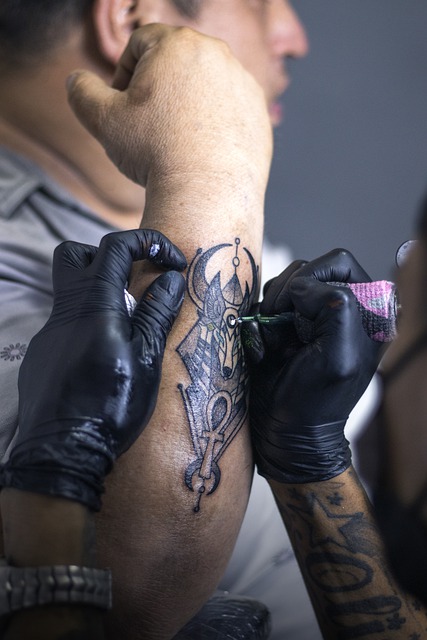When you have an itch, it means that the skin around your tattoo or piercing is irritated. Itchy tattoos and piercings can be due to a variety of reasons- from the tattoo itself to how it was placed. Sometimes, the skin around a tattoo or piercing will become irritated simply from being in contact with other things.

Now, the question is can you slap your tattoo if it itches? Neither it is right or wrong to answer this question. Some people find tattoos and piercings irritating, while others find them very aesthetically pleasing.
Some people find it difficult to live without their tattoos or piercings, while others enjoy the feeling of having them. But, what actually should you do?
In this article, you’re going to have the best solution to this argumental topic you may ever face. Plus you’ll know the reasons behind tattoo itching, some effective ways to avoid it, and the ultimate guide to having a tattoo without even a single touch of itching.
So, let’s go. Shall we?
Can You Slap Your Tattoo If Itches – Let’s Have The Answer
If you have any ink, whether it’s tattoos or piercings, you know that they can be a source of irritation. But sometimes, the itch is worth the pain. Here are some tips for can you slap your tattoos and piercings while it’s itching that may help you avoid some of the common issues.
Yes, you can slap your tattoo if it itches. However, it’s not recommended to do so because the skin around the tattoo is typically very sensitive and slapping could cause damage.
Why do people want to slap their tattoos?

People often want to slap their tattoos because they find them irritating or uncomfortable. Tattoos can be a source of irritation for people of all ages, and piercings can be similarly troublesome. For some people, it’s an annoyance that has to be endured; for others, it’s a beautiful addition to their body that they want to keep as long as possible.
What to do if the itch is unbearable
If the itch is unbearable and you’re not able to scratch it, then you may need to get a bandaid. You can also try using a topical ointment or cream that will help stop the itching. Alternatively, you can put some ice on the area to reduce the amount of itching.
How to care for your itchy tattoo or piercing
Tattoos and piercings can take a lot of care when they start to itch.
Let’s see some effective and useful ways to take care of your mind-blowing tattoo-
First, try using an ointment or cream to soothe the area. If the itch is severe, you may need to seek professional help to treat the irritation.
Second, avoid scratching the tattoo or piercing. This will help stop the itching and also make it easier to keep the area clean.
Third, put a bandanna or other soft cloth over the area when you’re not using it. Cool and dry will be maintained by this process.
Fourth, avoid hot water or baths for a few minutes after you’ve applied an ointment or cream to the tattoo or piercing.
And finally, avoid using harsh chemicals which are bad for tattoo cream on tattoos and piercings, as these can cause further irritation.
How to avoid pain from tattoos and piercings
Avoiding pain from tattoos and piercings is not rocket science to do. Following a few simple instructions can keep you free from this never-wanted pain.
One of the most common problems people experience when they have tattoos or piercings is that they start to itch. This can be a huge pain, and it can be difficult to avoid scratching the tattoo or piercing. Scratch-proofing your tattoo or piercing will help you keep it from getting scratched. You can use an adhesive bandage to hold the tattoo in place, or you can use a product that’s specifically designed to protect tattoos and piercings from scratches.
Let’s have a look
- Make sure you’re getting the right tattoo or piercing services. Many businesses offer a wide variety of tattoo and piercing services, but not all of them are created equal.
- If you’re considering a tattoo or piercings, be sure to find out what kind of services the business offers and how much those services will cost.
- Talk to your doctor before getting any tattoos or piercings. There may be risks associated with tattoos and piercings, and it’s important to be aware of them before making any decisions.
- Ask your doctor about any potential side effects and what kind of care you should take if they occur.
- Use an appropriate numbing agent before getting tattoos or piercings. This will help reduce pain and swelling during the process.
- Wear a comfortable clothing item when getting tattoos or piercings. You don’t want to cause pain by wearing something that is too tight or that will rub against your skin.
- Drink plenty of water while getting tattoos or piercings. This will help keep your body hydrated and minimize swelling.
- Keep your piercing clean and dry. The more moisture it has, the more irritation it will cause.
- Use a topical ointment to reduce the amount of itching. This will also help to prevent any infection.
- Avoid scratching the tattoo or Piercing itself with anything other than a clean cloth or an appropriate sterile cleaner. This will help to keep them healthy and free from infection.
how to relieve itchy new tattoos and piercings.
- Wash your tattoos and piercings regularly with soap and water. This will help remove any built-up oils and sweat.
- Avoid contact with direct sunlight or air. Sun exposure can cause the ink to fade faster, and it can also cause pain from the heat.
- Avoid using harsh chemicals or solvents on your tattoos or piercings. These may damage the skin and make it difficult to read or see the tattoo or piercing.
- Keep your tattoos and piercings clean and free of bacteria. Bacteria can cause irritation, pain, and even infection.
- If you experience any discomfort from your tattoos or piercings, seek medical attention immediately. You may need to go through surgery to fix the problem.
3 reasons can be why does tattoo itch more at night
The research found that there are a few reasons why a tattoo may itch more at night.
- One reason is that the body is cooler at night, which can make the skin feel itchier.
- Another reason is that people are usually more relaxed at night and may scratch their tattoos more.
- Finally, some people may have an allergic reaction to the tattoo ink, which can cause the tattoo to itch more at night.
how to itch a tattoo without scratching
There are a few ways to itch a tattoo without scratching. One is to use an ice cube or cotton ball and dip it in cream or vaseline. Apply the cream or vaseline to the tattoo and then hold the ice cube or cotton ball against the skin for a few minutes. Another way is to use alcohol wipes. Wet one side of the wipe and then apply it to the tattoo. Wipe off any residue with another dry wipe.
Why tattoo itching after a week reason and prevent
There are a few reasons why a tattoo may itch after a week. The first is that the tattoo is still healing. The skin will start to itch as it heals and the tattoo starts to fade. The second reason is that the tattoo was not done properly. The tattoo artist may have not cleaned the area properly or may have used too much ink. The third reason is that the person may be allergic to the ink or the chemicals in the ink.
There are a few things that can be done to help prevent tattoo itchiness. First, make sure to keep the tattoo clean and dry. Gently wash it with soap and water, and pat it dry. Second, apply a thin layer of lotion to the tattoo to help keep the skin hydrated. Third, avoid scratching or picking at the tattoo, as this can lead to infection. If the tattoo does start to itch, try to resist the urge to scratch it. Instead, gently pat the area with a cool, damp cloth.
In conclusion, when it comes to itching, slapping is not the way to go. Slapping your skin when it’s in pain will only worsen the situation and cause more pain and inflammation. Instead, try taking a break and treat your tattoo like a newly healed wound: don’t soak it in water or expose it to harsh chemicals for about two weeks after getting one. That way, you won’t have to deal with any delayed healing time, and itchy tattoos should come with an expiration date of infinity!


